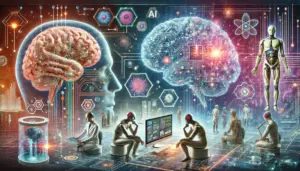Artificial Intelligence and the Mind: Exploring the Intersection
Welcome to our blog! Today, we’re diving into the intriguing world where artificial intelligence (AI) meets human cognition. The relationship between AI and the mind is a topic that sparks curiosity and wonder. Let’s explore how these two realms intersect and what the future might hold.
Understanding Artificial Intelligence
Artificial intelligence refers to the development of computer systems capable of performing tasks that typically require human intelligence. These tasks include learning, reasoning, problem-solving, understanding natural language, and perception. AI systems are designed to mimic cognitive functions, often using algorithms and neural networks that resemble the human brain’s structure.
Types of AI
Narrow AI: Also known as Weak AI, this type is designed for specific tasks such as facial recognition or internet searches. Examples include virtual assistants like Siri and Alexa.
General AI: Also known as Strong AI, this type aims to understand and learn any intellectual task that a human can. It’s still a theoretical concept and has not yet been achieved.
Superintelligent AI: This refers to AI that surpasses human intelligence. While purely speculative at this point, it raises significant ethical and existential questions.
The Human Mind
The human mind is an intricate system responsible for our thoughts, emotions, memories, and consciousness. It encompasses both the conscious and subconscious levels of awareness, allowing us to navigate complex environments, solve problems, and experience the world around us.
Key Components of the Mind
Consciousness: The state of being aware of and able to think about one’s own existence, thoughts, and surroundings.
Subconscious: The part of the mind that influences feelings, thoughts, and actions without conscious awareness.
Cognition: The mental action or process of acquiring knowledge and understanding through thought, experience, and the senses.
AI and Cognitive Science
The field of cognitive science explores the nature of intelligence, combining insights from psychology, neuroscience, computer science, and philosophy. AI researchers draw inspiration from cognitive science to create systems that can simulate human thinking processes.
Neural Networks and the Brain
Artificial neural networks are a cornerstone of AI, inspired by the human brain’s network of neurons. These systems learn from data by adjusting the connections (weights) between nodes (neurons), similar to how the brain strengthens or weakens synaptic connections based on experiences.
Parallels Between AI and Human Cognition
Learning and Adaptation
Human Mind: The human brain learns through experiences, adapting its neural pathways in response to new information and stimuli.
AI Systems: AI algorithms learn from vast amounts of data, continuously improving their performance through techniques such as machine learning and deep learning.
Decision-Making
Human Mind: Decision-making involves evaluating options, considering potential outcomes, and selecting a course of action based on reasoning and intuition.
AI Systems: AI systems use algorithms to analyze data, predict outcomes, and make decisions. Advanced systems can incorporate probabilistic reasoning and reinforcement learning to refine their choices.
Problem-Solving
Human Mind: Problem-solving often requires creative thinking, pattern recognition, and the application of knowledge to new situations.
AI Systems: AI excels at pattern recognition and can solve problems by identifying solutions based on learned patterns and algorithms. However, true creativity remains a challenge.
The Future of AI and the Mind
The future of AI holds immense potential for enhancing our understanding of the mind and revolutionizing various aspects of life. Here are some exciting prospects:
Enhancing Cognitive Abilities
AI can augment human intelligence by providing tools that enhance memory, decision-making, and problem-solving. For example, AI-powered applications can help manage information overload and offer personalized learning experiences.
Mental Health and Well-Being
AI has the potential to transform mental health care by providing virtual therapists, predicting mental health issues through data analysis, and offering support through AI-driven apps and chatbots.
Ethical Considerations
As AI continues to evolve, ethical considerations become paramount. Issues such as data privacy, algorithmic bias, and the potential for AI to surpass human intelligence need to be carefully addressed. Ensuring that AI is developed and deployed responsibly is crucial for the well-being of society.
Conclusion
The intersection of artificial intelligence and the human mind is a fascinating and rapidly evolving field. By understanding how AI mimics and enhances cognitive processes, we can unlock new possibilities for human potential. As we move forward, it is essential to approach AI development with ethical considerations, ensuring that these advancements benefit humanity as a whole.
Thank you for reading our blog! Stay tuned for more insights into the world of AI and the mind. If you have any questions or topics you’d like us to cover, feel free to reach out. Let’s continue exploring this incredible journey together.
FAQs
Q1. How does AI learn and adapt?
AI learns and adapts through algorithms that process vast amounts of data. Techniques such as machine learning and deep learning enable AI systems to improve their performance over time.
Q2. What is the difference between Narrow AI and General AI?
Narrow AI is designed for specific tasks, while General AI aims to understand and learn any intellectual task that a human can. General AI remains theoretical and is not yet achieved.
Q3. Can AI truly replicate human creativity?
While AI can simulate certain aspects of creativity by identifying patterns and generating new combinations, true human creativity, which involves emotions and unique personal experiences, remains challenging for AI to replicate fully.
Q4. How can AI be used in mental health care?
AI can provide virtual therapy, predict mental health issues through data analysis, and offer support through AI-driven apps and chatbots, transforming mental health care accessibility and effectiveness.
Q5. What ethical considerations are important in AI development?
Key ethical considerations include data privacy, algorithmic bias, and the potential for AI to surpass human intelligence. Responsible AI development is crucial for ensuring societal well-being.
